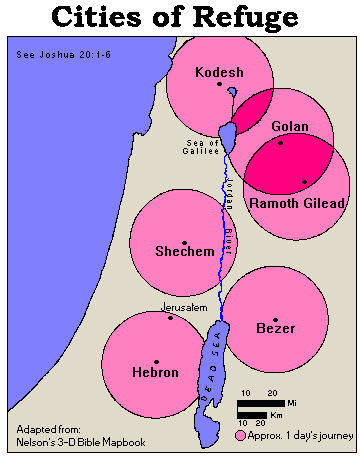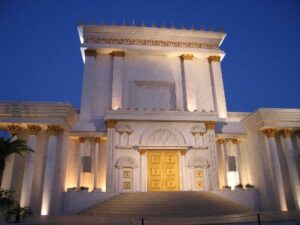Dn – Moving a Boundary Stone 19: 14
Moving a Boundary Stone
19: 14
Moving a boundary stone DIG: How were the portions of land determined once the Israelites conquered Canaan? How were their boundaries established? How could a dishonest person cheat his neighbor? Why would this be so devastating to the victim of this crime? Were the Jews the only ones who had this problem? What did this mitzvah have to do with the Ten Words?
REFLECT: How do people steal land, businesses, or property from the poor and the needy today? Do you think most thieves get caught today? If the courts can’t help, who do we turn to? Do you have the assurance that ultimately thieves aren’t getting away with anything (see the commentary on Revelation, to see link click Fo – The Great White Throne Judgment)?
Moving a boundary stone from its place was virtually an attack on the neighbor’s livelihood.
Deuteronomy 19:1 to 26:15 (to see link click Dl – The Social and Family Mitzvot) deals with individual mitzvot, and to today’s readers they might appear irrelevant at first, but the very principles behind these commandments were the ones that have brought dignity to mankind. We need to examine these mitzvot in depth to discover the spirit in which they were given, so that we can still live in obedience to God’s Word today. For example, in Numbers 18, the Israelites were to bring their tithes to the Tabernacle because the priests and Levites had no inheritance. But today we have no Temple and no priesthood; however, we bring our tithes to our place of worship. That is the spirit of the mitzvah.

You are not to move your neighbor’s boundary stone from the place where people put it long ago, in the inheritance soon to be yours in the Land ADONAI your God is giving you to possess (19:14).
After Isra’el conquered the land of Canaan, each tribe was assigned its territory and their borders accurately described. Joshua, Eleazar the high priest, and the heads of the twelve tribes cast lots and divided up the portions that Bnei-Yisra’el possessed (Joshua 14:1-2). Within the tribes, each family and clan would make its own claim and mark it out with boundary stones. In that day, they didn’t draw up detailed real estate maps. In the Near East, the fields of different owners are not marked by fences, but by posts, or by single stones. Everyone was expected to honor the boundary stone because to move the stones was to steal land from their neighbors and their descendants. This basically meant the economic survival for each family, and also the family’s tangible proof of membership in the covenant community. But it was easy for a dishonest man to move those landmarks, little by little each year, and thus gradually steal from his neighbor. Therefore, the mitzvah: Do not move an ancient boundary stone which your fathers set up (Proverbs 22:28).423
Not only the Jews, but other ancient nations, especially the Romans, had tough laws against the removal of landmarks. In the British Museum are three very curious Babylonian monuments which are supposed to have been landmarks, covered with curses for those who would try to remove them. One of them is made up of marble, fashioned in the shape of a massive fish. On the head is the figure of a serpent, and various other characters; and on the other side, in arrow-headed letters, are the curses.424
Moving a boundary stone was a violation of the eighth mitzvah (see Bs – Do Not Steal), and as Micah 2:1-2 shows, it is also rooted in the tenth mitzvah as well (see Bu – Do Not Covet). In fact, as an attack on a covenant neighbor, striking at his share of the covenant land given to him by YHVH, theft was indirectly a crime against God. No wonder this crime was included among the curses announced from Mount Ebal. It comes high on the list, only after idolatry and dishonoring parents: “Cursed is the one who removes his neighbor’s boundary stone.” Then all the people are to say, “Amen” (27:17).425 Crimes in this list were committed in secret in the hope that the offender might never appear before a human court. But such people were committed to the judgment of Ha’Shem, who would carry out the curse. Elsewhere in the TaNaKh, both wisdom writers (Job 24:2-4; Proverbs 15:25 and 23:10-11), and the prophets (Isaiah 5:8 and Hosea 5:10) refer to land grabbing as part of their warning or rebuke.
But the prophetic and wisdom sayings also suggest that the mitzvah goes further, to include extortion, the deliberate taking over the land of the poor by the powerful, or the making of unjust mitzvot so they could rob the helpless: The people of the land have oppressively blackmailed, plundered in robbery, wronged the poor and the needy and abused the outsider unjustly (Ezeki’el 22:29). The story of Ahab and Naboth illustrates the motive behind the crime (First Kings 21). The prominent position of this mitzvah shows how closely the need to respect the life and means of others is bound up in Deuteronomy with the prohibition of murder itself (see Bq – Do Not Murder).426
Dear wonderful Heavenly Father, Praise You that You are so kind and loving! Praise You that Your concept of true religion is loving. Religion that God our Father accepts as pure and faultless is this: to look after orphans and widows in their distress and to keep oneself from being polluted by the world (James 1:27). You are wonderful! In Yeshua’s holy name and power of His resurrection. Amen



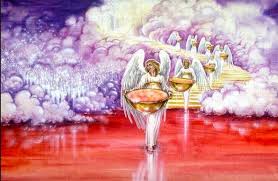 …y del santuario salieron los siete ángeles que tienen las siete plagas, vestidos de lino puro y resplandeciente, y ceñidos alrededor del pecho con fajines de oro (15:6). Del santuario del Tabernáculo (vea el comentario sobre
…y del santuario salieron los siete ángeles que tienen las siete plagas, vestidos de lino puro y resplandeciente, y ceñidos alrededor del pecho con fajines de oro (15:6). Del santuario del Tabernáculo (vea el comentario sobre 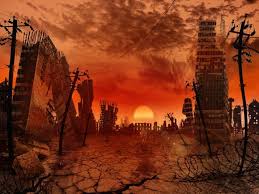
 Como muy probables representantes de la Iglesia en el cielo: los veinticuatro ancianos que estaban sentados en sus tronos ante Dios, se postraron sobre sus rostros, y adoraron a Dios, diciendo: Te damos gracias, Señor Dios, Todopoderoso, el que eres y el que eras, porque has tomado tu gran poder y asumiste el reino (11:16-17). Y este Dios, por supuesto, no es otro que Jesús Cristo. Esta es la misma Persona, usando las mismas palabras que el Mesías glorificado, con quien Juan se encontró al principio del libro (1:4 y 8). Él nos protegerá y no tendremos nada de qué preocuparnos.
Como muy probables representantes de la Iglesia en el cielo: los veinticuatro ancianos que estaban sentados en sus tronos ante Dios, se postraron sobre sus rostros, y adoraron a Dios, diciendo: Te damos gracias, Señor Dios, Todopoderoso, el que eres y el que eras, porque has tomado tu gran poder y asumiste el reino (11:16-17). Y este Dios, por supuesto, no es otro que Jesús Cristo. Esta es la misma Persona, usando las mismas palabras que el Mesías glorificado, con quien Juan se encontró al principio del libro (1:4 y 8). Él nos protegerá y no tendremos nada de qué preocuparnos.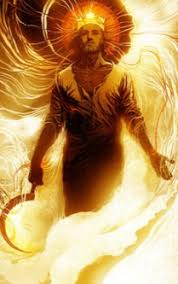 El segador se describe además como teniendo en su cabeza una corona de oro, y en su mano una hoz afilada (14:14b). La corona no es la diadema que usa un rey (19:12), sino los stephanos que usan los vencedores en la guerra o en el concurso deportivo. Es la corona de gloria (Primera Pedro 5:1-4), y representa
El segador se describe además como teniendo en su cabeza una corona de oro, y en su mano una hoz afilada (14:14b). La corona no es la diadema que usa un rey (19:12), sino los stephanos que usan los vencedores en la guerra o en el concurso deportivo. Es la corona de gloria (Primera Pedro 5:1-4), y representa 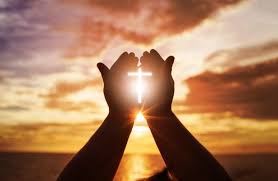 Hay un intervalo importante entre los primeros tres ángeles (14:6-11) y los últimos tres ángeles en 14:14-20. Podemos respirar entre toda la ira de Dios, para un consuelo muy necesario sobre nuestra propia salvación.
Hay un intervalo importante entre los primeros tres ángeles (14:6-11) y los últimos tres ángeles en 14:14-20. Podemos respirar entre toda la ira de Dios, para un consuelo muy necesario sobre nuestra propia salvación.